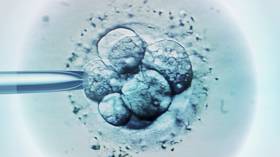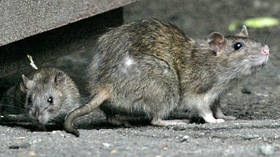Mice with two fathers created in lab – researcher

Scientists at a Japanese lab have produced healthy offspring from two male parents using a gene-editing technique to create viable egg cells from the skin, a leading stem cell researcher has claimed.
The breakthrough was reported on Wednesday by Professor Katsuhiko Hayashi from Osaka University during the International Summit on Human Genome Editing in London. Hayashi has been working on various techniques to make eggs from stem cells for a decade. His latest paper on the subject is pending publication in the magazine Nature, he told the BBC.
The artificial gametogenesis – or in-lab production of sex cells – was done on mice, the scientist reported in London during an update on core technologies in the field of genome editing. It involved reprogramming a skin cell into a pluripotent stem cell – a type of cell that can turn into other kinds of cells later.
The scientists removed the Y-chromosome from the stem cells and created copies of the X-chromosome to replace it. With a full XX set, the cells turned into eggs, though only a small percentage of the source material could be made to undergo the full process.
The result was of relatively poor quality, with just seven pups coming out of 630 attempts to implant fertilized embryos into surrogate mothers, Hayashi explained during the event. But those seven “looked OK,” he added, meaning they developed normally and had offspring of their own.
In 2018, Chinese scientists reported breeding mice from same-sex parents, but in their experiment the pups turned out to be unhealthy and did not live long.
Hayashi warned that the method devised by his lab is a long way from maturity, and it may take a decade before it could be used for human fertility treatment.
The method does, however, give hope to same-sex couples that they may be able to have children who are genetically linked to them, although such kind of reproduction would first have to be accepted by society, the scientist argued. If that happens, he would favor such use, he told BBC.
He added that technically it could be possible for a man to conceive a baby using an artificial egg made from a somatic cell and sperm, but he is “not so sure whether at this stage it is safe or acceptable for society.”














